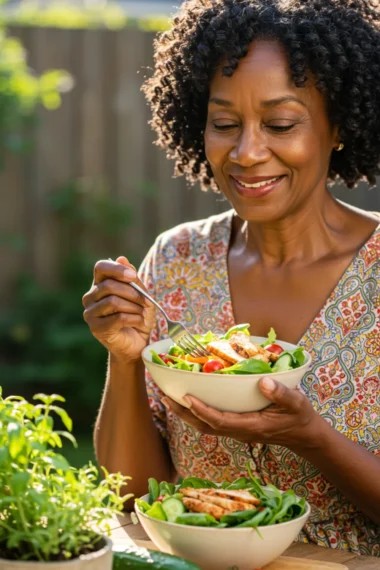The Importance of a Healthy Diet for Seniors | Key Nutrients & Meal Planning Tips
According to the National Institute on Aging, adults over 65 need fewer calories but more vitamins, minerals, and fiber to stay strong and independent. Yet, over 38% of seniors in the U.S. are either malnourished or at risk of malnutrition, despite having enough food
Why Senior Nutrition Is Different?
As we age, our bodies change—plain and simple. Digestion slows down, muscles shrink, and the risk of chronic illness increases. That means nutrition needs shift drastically in the golden years.
Here’s what typically happens after 60:
- Slower Metabolism: Seniors burn fewer calories, leading to weight gain if diets aren’t adjusted.
- Weaker Absorption: Vitamin B12, calcium, and magnesium absorption reduces with age.
- Bone Loss: Osteoporosis risk rises due to declining estrogen and calcium levels.
- Muscle Decline: Sarcopenia (loss of muscle mass) affects 1 in 3 people over 60.
- Dehydration: The body retains less water, yet the thirst response is weaker.
- Appetite Drops: Dental problems, medications, or loneliness can reduce appetite.
Seniors need more nutrients in fewer calories—a tough combo without proper guidance.
Top 12 Nutrients Seniors Need Most
These are the MVPs of senior nutrition—each with a purpose and food sources to go with it:
| Nutrient | Why It Matters | Best Sources |
|---|---|---|
| Calcium | Prevents bone loss, supports muscles | Dairy, tofu, leafy greens |
| Vitamin D | Aids calcium absorption, supports immunity | Sunlight, fortified milk, salmon |
| Fiber | Improves digestion, heart health | Oats, beans, fruits, vegetables |
| Protein | Maintains muscle and strength | Eggs, chicken, lentils, Greek yogurt |
| Vitamin B12 | Supports nerve function, brain health | Eggs, fish, fortified cereals |
| Omega-3s | Reduces inflammation, supports heart/brain health | Salmon, chia seeds, walnuts |
| Potassium | Balances fluids, lowers blood pressure | Bananas, sweet potatoes, spinach |
| Magnesium | Muscle/nerve function, bone health | Nuts, seeds, whole grains |
| Iron | Prevents fatigue and anemia | Beans, red meat, spinach |
| Zinc | Supports immune function and wound healing | Shellfish, meat, legumes |
| Water | Prevents dehydration, boosts energy | Water, broths, herbal teas |
| Antioxidants | Protect against cognitive decline and inflammation | Berries, tomatoes, green tea |
10 Benefits of a Healthy Diet for Seniors
Eating right can feel like magic. Here’s what proper nutrition unlocks:
- Stronger Bones & Joints – Reduces fractures and arthritis pain.
- Sharper Memory – Omega-3s and B12 improve cognitive function.
- Fewer Digestive Issues – Fiber cuts down on constipation.
- Lower Risk of Heart Disease – Leafy greens and nuts improve heart health.
- More Energy – Balanced blood sugar keeps fatigue at bay.
- Faster Wound Healing – Zinc and protein support recovery.
- Better Immunity – Vitamins A, C, and D boost defense against illness.
- Improved Mood – Nutrients like magnesium lift spirits naturally.
- Healthy Weight Maintenance – Balanced meals prevent gain or dangerous loss.
- Reduced Risk of Diabetes – Low-GI foods help regulate blood sugar.
What Foods Should Seniors Eat?
Here’s your senior-friendly grocery checklist:
- Fruits – Apples, berries, oranges, and bananas
- Vegetables – Spinach, kale, carrots, broccoli
- Lean Proteins – Chicken, turkey, tofu, fish
- Whole Grains – Oatmeal, brown rice, quinoa
- Healthy Fats – Olive oil, avocado, nuts
- Low-fat Dairy – Greek yogurt, cottage cheese, skim milk
- Herbs & Spices – Turmeric, garlic, ginger for flavor and health
- Hydration – At least 8 cups of water or non-caffeinated beverages daily
Foods Seniors Should Avoid
Some foods might taste good but wreak havoc on senior health.
- Processed Meats – High in sodium and preservatives
- Fried Foods – Add empty calories and bad fats
- Sugary Snacks & Drinks – Spike blood sugar and lead to crashes
- Canned Soups – Often high in sodium
- White Bread & Pasta – Lack fiber and spike blood sugar
- Alcohol – Interferes with medications and sleep
Sample One-Day Healthy Meal Plan
Breakfast:
- 1 bowl of oatmeal with berries
- 1 boiled egg
- Green tea

Lunch:
- Grilled chicken salad with olive oil vinaigrette
- Whole grain bread slice
- Fresh orange
Snack:
- Greek yogurt with flaxseeds
Dinner:
- Baked salmon
- Steamed broccoli and sweet potato
- Chamomile tea
Before bed:
- A glass of warm skim milk (calcium + better sleep)
Tips for Grocery Shopping on a Budget
Eating healthy doesn’t mean going broke. Try this:
- Buy frozen fruits/veggies – Same nutrients, longer shelf life
- Use senior discount days – Most stores offer 5-10% off
- Plan meals ahead – Stick to a list, avoid impulse buys
- Buy store brands – Often cheaper but same quality
- Cook in batches – Freeze leftovers for easy meals
Common Senior Diet Myths – Busted!
Myth 1: Seniors don’t need much protein.
Truth: They need more—to fight muscle loss.
Myth 2: Supplements are better than real food.
Truth: Whole foods absorb better and offer more balance.
Myth 3: It’s okay to skip meals if you’re not hungry.
Truth: Skipping meals leads to nutrient deficiencies and weakness.
Myth 4: Sugar-free foods are always healthy.
Truth: Many contain artificial sweeteners and additives.
Wrapping Up: Eat Well to Live Well
A healthy diet for seniors is not about restriction—it’s about fueling the next chapter with strength, clarity, and joy. With just a few smart choices each day, seniors can manage chronic conditions, stay mentally sharp, and maintain independence for longer.
Start with small changes. Add a veggie here, swap white bread for whole grain there. It all adds up.
Got a loved one who’s struggling with meals? Share this post, stock the fridge together, or prepare a dish from the sample meal plan. Because good food isn’t just nutrition—it’s love.
FAQs
How many meals should seniors eat daily?
Most seniors benefit from 3 small meals and 2 healthy snacks.
Should older adults take supplements?
Only if a doctor recommends it. Focus on whole foods first.
What diet helps prevent dementia?
The MIND diet (a combo of Mediterranean + DASH diet) supports brain health.
How much water should a 70-year-old drink daily?
Roughly 7–9 cups, unless restricted by a doctor.
Is it okay to eat eggs every day?
Yes—unless cholesterol is a concern. Boiled or poached eggs are ideal.











